In this week’s column we feature books that originated in Australia and New Zealand. Some of these books aim to increase awareness and understanding of the history and culture of these countries while others introduce students to authors and illustrators from “Down Under” whose stories are imaginative and full of fun and adventure.
Ages 4–8
Archie and the Bear. Zanni Louise. Ill. David Mackintosh. 2018. Clarion/Houghton Mifflin.
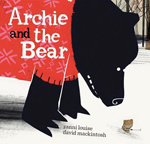 When people tell a small boy named Archie they like his bear suit, he growls, “It’s not a suit. I am a bear!” Angrily stomping off deep into the forest one day, Archie comes across a huge black bear dressed in a red sweater. When the bear greets him with a friendly hello, Archie says, “I like your boy suit.” The bear growls, “It’s not a suit. I am a boy!” Mackintosh’s imaginative use of perspective in the mixed-media illustrations exaggerates the size difference between Archie and the bear as the two spend the day together—with Archie sharing “bear” things and the bear sharing “boy” things. By nightfall, they realize that boys and bears enjoy many of the same things in the warm and cozy ending to this friendship story.
When people tell a small boy named Archie they like his bear suit, he growls, “It’s not a suit. I am a bear!” Angrily stomping off deep into the forest one day, Archie comes across a huge black bear dressed in a red sweater. When the bear greets him with a friendly hello, Archie says, “I like your boy suit.” The bear growls, “It’s not a suit. I am a boy!” Mackintosh’s imaginative use of perspective in the mixed-media illustrations exaggerates the size difference between Archie and the bear as the two spend the day together—with Archie sharing “bear” things and the bear sharing “boy” things. By nightfall, they realize that boys and bears enjoy many of the same things in the warm and cozy ending to this friendship story.
—CA
Heads and Tails. John Canty. 2018. Candlewick.
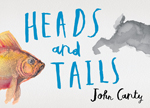
Would you be able to correctly guess an animal after seeing only its tail? Clever clues and watercolor illustrations invite readers to sharpen their creature-identification skills in this guessing game picture book. With a turn of the page, the front end of the animal is revealed along with its name. Featured animals include a rabbit, snake, fish, rhinoceros, elephant, tortoise, cat, crocodile, giraffe, fox, frog, and kangaroo.
—CA
I Just Ate My Friend. Heidi McKinnon. 2018. Simon & Schuster.
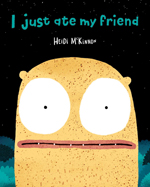
In author/illustrator Heidi McKinnon’s debut picture book, a hulky, yellow-speckled monster with big round eyes remorsefully admits to having just eaten his friend. In search of a new friend, the monster begins to realize that a new friend may be hard to come by as the various animals he meets consider him too big or too scary. In an unexpected turn of events, the story comes full circle when he thinks he’s found a new friend at last. McKinnon’s text is minimal, which requires that readers pay close attention to facial expressions to understand the emotions that are integral to the story.
—CBB
I’m an Immigrant Too! Mem Fox. Ill. Ronojoy Ghosh. Beach Lane/Simon & Schuster.
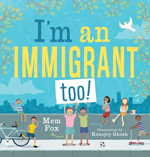 With a simple rhyming text and colorful illustrations, Fox and Ghosh invite young children to visit their home country and hear from children who have stories to tell about how they came to Australia. Including families from Ireland in 1849 to recent refugees from Somalia, Afghanistan, and Syria, this picture book is a glorious celebration of how immigrants have enriched the cultural diversity of Australia. The book ends with a young refugee still seeking asylum in Australia, which serves as a reminder of present-day immigration issue throughout the world. The book opens with a “Where We Came From” map and ends with a “Where We Live Now” map.
With a simple rhyming text and colorful illustrations, Fox and Ghosh invite young children to visit their home country and hear from children who have stories to tell about how they came to Australia. Including families from Ireland in 1849 to recent refugees from Somalia, Afghanistan, and Syria, this picture book is a glorious celebration of how immigrants have enriched the cultural diversity of Australia. The book ends with a young refugee still seeking asylum in Australia, which serves as a reminder of present-day immigration issue throughout the world. The book opens with a “Where We Came From” map and ends with a “Where We Live Now” map.
—CA
Welcome to Country: A Traditional Aboriginal Ceremony. Aunty Joy Murphy . Ill. Lisa Kennedy. 2018. Candlewick.
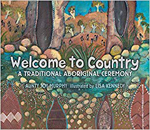 Aunty Joy Murphy's first book provides an insider perspective of the Wurundjeri people as readers are invited to a traditional welcome ceremony. (The Wurundjeri people show respect for Murphy and other elders by calling them Aunty or Uncle.) During the ceremony, readers learn that Bunjil the eagle created the people, animals, and landforms and watches over the both the living and the dead of this Aboriginal culture. As part of the welcome ceremony, Murphy invites us, as visitors, to take and accept a white river gum leaf as long as we promise to give back what we take from the land. Illustrator Lisa Kennedy uses acrylic on canvas to depict the vibrant, lush, and welcoming land of the Wurundjeri people.
Aunty Joy Murphy's first book provides an insider perspective of the Wurundjeri people as readers are invited to a traditional welcome ceremony. (The Wurundjeri people show respect for Murphy and other elders by calling them Aunty or Uncle.) During the ceremony, readers learn that Bunjil the eagle created the people, animals, and landforms and watches over the both the living and the dead of this Aboriginal culture. As part of the welcome ceremony, Murphy invites us, as visitors, to take and accept a white river gum leaf as long as we promise to give back what we take from the land. Illustrator Lisa Kennedy uses acrylic on canvas to depict the vibrant, lush, and welcoming land of the Wurundjeri people.
—CBB
Ages 9–11
A Is for Australian Animals. Frané Lessac. 2018. Candlewick.
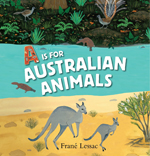 Did you know that, although the Irukandji jellyfish is one of the most poisonous creatures in the world, the leatherback turtle is one of the few animals not affected by their venom? This is just one of the fascinating facts about the amazing diversity of Australian animals in this alphabet book. Lessac’s colorful, gouache, folk art-inspired illustrations depict the animals in their natural habitats. A Is for Australian Animals can be enjoyed in one sitting or in small bursts. The final page includes maps of animal distribution for the animals featured in the book.
Did you know that, although the Irukandji jellyfish is one of the most poisonous creatures in the world, the leatherback turtle is one of the few animals not affected by their venom? This is just one of the fascinating facts about the amazing diversity of Australian animals in this alphabet book. Lessac’s colorful, gouache, folk art-inspired illustrations depict the animals in their natural habitats. A Is for Australian Animals can be enjoyed in one sitting or in small bursts. The final page includes maps of animal distribution for the animals featured in the book.
—CBB
Cook’s Cook: The Cook Who Cooked for Captain Cook. Gavin Bishop. 2018. Gecko.
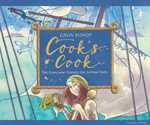 HMS Endeavour was the British Royal Navy research vessel that Lieutenant James Cook commanded during a scientific expedition to the South Seas from 1768 to 1771. In 1770, Endeavour became the first ship to reach the east coast of Australia at Botany Bay. Gavin Bishop’s account of the voyage is told from the perspective of John Thompson, the ship’s one-handed cook. Through short entries in his cook’s log, Thompson provides updates on where the Endeavor is and events occurring on the voyage. The text also includes some of his recipes for feeding the crew (including pease porridge, albatross, and even dog and breadfruit stew), techniques for combating scurvy, and other trials and tribulations of such a long journey in close quarters. Bishop’s richly detailed illustrations, created in watercolor and acrylic ink, depict diagrams of the ship, portraits of the explorers and crew, recipe cards, places visited, and a map on the back endpaper of the route of the voyage.
HMS Endeavour was the British Royal Navy research vessel that Lieutenant James Cook commanded during a scientific expedition to the South Seas from 1768 to 1771. In 1770, Endeavour became the first ship to reach the east coast of Australia at Botany Bay. Gavin Bishop’s account of the voyage is told from the perspective of John Thompson, the ship’s one-handed cook. Through short entries in his cook’s log, Thompson provides updates on where the Endeavor is and events occurring on the voyage. The text also includes some of his recipes for feeding the crew (including pease porridge, albatross, and even dog and breadfruit stew), techniques for combating scurvy, and other trials and tribulations of such a long journey in close quarters. Bishop’s richly detailed illustrations, created in watercolor and acrylic ink, depict diagrams of the ship, portraits of the explorers and crew, recipe cards, places visited, and a map on the back endpaper of the route of the voyage.
—CBB
The 91-Story Treehouse(Treehouse Books #7). Andy Griffiths. Ill. Terry Denton. 2018. Feiwel and Friends.
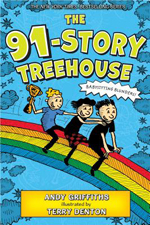 Andy and Terry’s 91-story treehouse is not just any old treehouse. There’s a tent with a fortune teller named Madame Know-It-All, a submarine sandwich shop that makes sandwiches the size of an actual submarine, and a big red button (they aren’t sure what it does), along with various other imaginative features that they keep adding. When Andy and Terry’s publisher, Mr. Big Nose, asks then to babysit his three grandchildren, they agree but are so overly focused on writing a new book that they forget about babysitting and lose the children in the treehouse. After a series of unfortunate (and hilarious) events, they find out the function of the big red button. The end of the book encourages readers to interact even further with word searches, crosswords, web links, and other puzzles.
Andy and Terry’s 91-story treehouse is not just any old treehouse. There’s a tent with a fortune teller named Madame Know-It-All, a submarine sandwich shop that makes sandwiches the size of an actual submarine, and a big red button (they aren’t sure what it does), along with various other imaginative features that they keep adding. When Andy and Terry’s publisher, Mr. Big Nose, asks then to babysit his three grandchildren, they agree but are so overly focused on writing a new book that they forget about babysitting and lose the children in the treehouse. After a series of unfortunate (and hilarious) events, they find out the function of the big red button. The end of the book encourages readers to interact even further with word searches, crosswords, web links, and other puzzles.
—CBB
Ages 12–14
The Red Fox Clan (Ranger’s Apprentice: The Royal Ranger #2). John Flanagan. 2018. Philomel/Penguin.
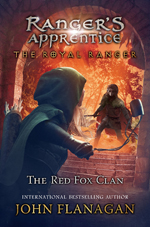 After completing her third year as a Ranger’s apprentice, Princess Madelyne (Maddie), the Royal Ranger, is eager to continue training under Ranger Will Treaty, but must first make her annual visit to Araluen. She’ll be happy to see her mother, Princess Regent Cassandra, and her father, Horace, but is not looking forward to the boredom of castle life, where she must keep her apprenticeship a secret. Maddie unexpectedly becomes involved with protecting Araluen Castle against attack by the Red Fox Clan, anarchists who want to overturn the present law of succession and return to a patriarchal system. Master storyteller John Flanagan continues his second book in this spinoff series with the same level of fast-paced adventure found in earlier books in his bestselling epic Ranger’s Apprentice series.
After completing her third year as a Ranger’s apprentice, Princess Madelyne (Maddie), the Royal Ranger, is eager to continue training under Ranger Will Treaty, but must first make her annual visit to Araluen. She’ll be happy to see her mother, Princess Regent Cassandra, and her father, Horace, but is not looking forward to the boredom of castle life, where she must keep her apprenticeship a secret. Maddie unexpectedly becomes involved with protecting Araluen Castle against attack by the Red Fox Clan, anarchists who want to overturn the present law of succession and return to a patriarchal system. Master storyteller John Flanagan continues his second book in this spinoff series with the same level of fast-paced adventure found in earlier books in his bestselling epic Ranger’s Apprentice series.
—CA
Ages 15+
The Stars at Oktober Bend. Glenda Millard. 2018. Candlewick.
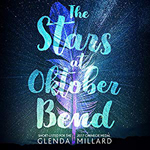
Fifteen-year-old Alice is a writer. At the age of 12 she was a victim of horrific violence and now her words come out slow and slurred. Glenda Millard captures Alice’s first-person narrative through short, staccato sentences and lack of capitalization. Manny, a refugee from Sierra Leone who was once a child soldier, finds the poems Alice writes in the most unexpected places around town and falls in love with her before he even meets her. This story is written from the perspectives of Alice and Manny, with voices differentiated through different fonts and sentence structure. The Stars at Oktober Bend is a thought-provoking young adult novel about two broken young people who find love.
—CBB
Tales From the Inner City. Shaun Tan. 2018. Arthur A. Levine/Scholastic.
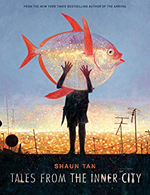 Author/illustrator Shaun Tan’s Tales from the Inner City is a highly imaginative book of illustrated short stories and poems in which wild and domestic animals live together with humans in urban settings. As always, the language of Shaun Tan’s storytelling is elegant and his surreal paintings are haunting and thought-provoking. Tan’s first sentences, such as “Where money gathers, so do pigeons,” these grab the attention of readers, making them eager to find out how each story unfolds in words and visual images.
Author/illustrator Shaun Tan’s Tales from the Inner City is a highly imaginative book of illustrated short stories and poems in which wild and domestic animals live together with humans in urban settings. As always, the language of Shaun Tan’s storytelling is elegant and his surreal paintings are haunting and thought-provoking. Tan’s first sentences, such as “Where money gathers, so do pigeons,” these grab the attention of readers, making them eager to find out how each story unfolds in words and visual images.
—CA
Chelsey M. Bahlmann Bollinger is an assistant professor in the Early, Elementary, and Reading Department at James Madison University, in Harrisonburg, Virginia. Carolyn Angus is former director of the George G. Stone Center for Children's Books, Claremont Graduate University, in Claremont, California.
These reviews are submitted by members of the International Literacy Association's Children's Literature and Reading Special Interest Group (CL/R SIG) and are published weekly on Literacy Daily.